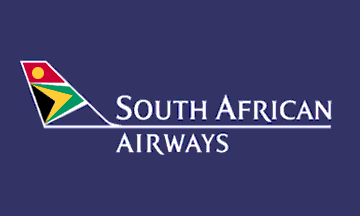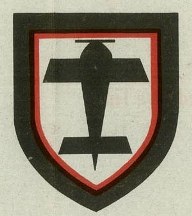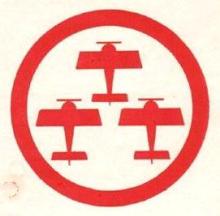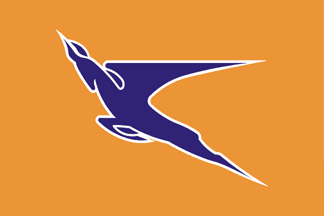 image
by Jens Pattke, 19 Dec 2006
image
by Jens Pattke, 19 Dec 2006
Last modified: 2015-05-26 by bruce berry
Keywords: south african airways | saa | union airways |
Links: FOTW homepage |
search |
disclaimer and copyright |
write us |
mirrors
 image
by Jens Pattke, 19 Dec 2006
image
by Jens Pattke, 19 Dec 2006
South African Airways (SAA) is one of the world's oldest airlines having
been formed on 01 February 1934, just over 30 years after the Wright
Brothers made the World's first powered flight on the 17 December 1903.
To trace back the airline's history, one needs to look at its predecessors,
Union Airways and South West African Airways. The first to be formed
was Union Airways which began operations on 24 July 1929. The South
African Government subsidized Union Airways to operate the airmail
service between the main centers in South Africa. As both mail and
passenger traffic grew, the airline expanded and its fleet was enlarged
with the purchase of two de Havilland Puss Moths. The fatal crash of
one of the Puss Moths followed by a Super Universal being written off
caused a shortage of aircraft. Help was accepted from South West
African Airways in the form of a 6 seat Junkers F 13. Later the two
airlines amalgamated but kept their separate identities. Five passenger
Junkers F13 was bought from Australia and at about the same time that
Imperial Airways started flying the first mail, and later passenger, services to Cape Town from London, Union Airways realized the potential
of flying scheduled services from Durban to Johannesburg to connect up
with Imperial Airways flights. An additional Junkers F13 and two larger
Junkers W34 were purchased to cope with the increased flights. Daily
flights were introduced between Durban and Johannesburg and the
airline's headquarters were also moved from Port Elizabeth to Durban.
South African Airways (SAA) was formed on 01 February 1934, taking over
the assets and liabilities of Union Airways, and fell under the control
of South African Railways and Harbours. A year later on 01 February
1935, South African Airways absorbed South West African Airways, its
aircraft and staff being offered positions in the airline. South West
African Airways had been formed in early 1931 by the Junkers South
Africa Company and the South West African Administration, and was
contracted to operate an air-mail service in the territory.
By 1947 the initial fleet of seven single-engined aircraft had grown to
41 aircraft and SAA was operating domestically, regionally and
internationally. Over the next few years the airline's route network
rapidly expanded to include some of the major cities in Europe and
Australia. By 1980, SAA provided scheduled services to Europe, North
and South America, Australia and the Far East. As a protest against the
then South African government's apartheid policy, the airline was denied
over-flying rights by most African countries between 1969 and 1991,
having to fly around the "bulge" of Africa and refuel at Ilha do Sal
(Cape Verde) to maintain services to its European destinations. With
its headquarters at Johannesburg's OR Tambo International Airport, today
SAA flies to 34 cities in 26 countries on six continents, carrying 6,5
million passengers per annum and is a member of the Star Alliance with 17 other
airlines.
Bruce Berry, 09 Nov 2006
John William Illslsey's book "In Southern Skies" (2003) contains a colour photo on page 165 of the pennant of South Africa's first commercial airline, Union Airways, which operated from 1929 to 1934. According to the caption, the pennant was used by aircraft when taxiing in after landing.
 image
with permission and courtesy of
Airline Timetable
Images
image
with permission and courtesy of
Airline Timetable
Images
The pennant is divided per saltire into yellow and red, and displays
the Union Airways coat of arms in the centre. This was a yellow/gold
shield depicting a black stylised aircraft in dorsal view, within a
black border fimbriated in red. Red and yellow were the company's
livery colours, and on the same page of the book is a photo of a
Fokker Super Universal decked out in those colours, and nicknamed the
"Red and Yellow Monster".
Union Airways were founded by Major Allister Miller, a significant
figure in early South African aviation (during World War I, he had
recruited some 2 000 South Africans for service in the Royal Air
Force). The company initially operated as an internal airmail
service, flying DH60 Gipsy Moth biplanes, but in 1930 it began
transporting passengers too, in the Fokker "Red and Yellow Monster"
until it crashed in 1931. In 1932, after amalgamating with South West
African Airways, UA acquired a few Junkers aircraft instead. The
government bought UA in 1934, and changed the name to South African
Airways (SAA). SAA took over SWA Airways in 1935.
 image
with permission and courtesy of
Airline Timetable
Images
image
with permission and courtesy of
Airline Timetable
Images
Illsley's book also contains (page 180) a rather indistinct photo of
the SWA Airways flag. This had a light-coloured background displaying the SWA Airways emblem
in the centre of a dark saltire. The airline timetable shows that the SWA Airways emblem consisted of three
stylised red aircraft inside a red circle.
Arthur Radburn, 05 Sept 2006
 image
by Martin Grieve, 09 Nov 2006
image
by Martin Grieve, 09 Nov 2006
Prior to 1997 the emblem of SAA was a blue "flying" Springbok, fimbriated in white, on an orange background. Orange, white and blue were the then national colours of South Africa and the springbok was the national emblem. The tail of SAA aircraft were a distinctive orange with the springbok logo in the centre. This was the same design as the airline house flag. SAA aircraft were emblazoned with the full name of the airline in English on one side and in Afrikaans (Suid-Afrikaanse Lugdiens) on the other.
In 1997 SAA introduced its new image and livery, dropping the springbok emblem and the old national colours of orange, white and blue. The new livery was based upon the new national flag, with a yellow ball (sun) placed in the red stripe. The airline's name on its aircraft was changed to simply 'South African', with the Afrikaans being dropped.
 scan by
Bruce Berry, 09 Nov 2006
scan by
Bruce Berry, 09 Nov 2006
The new flag of the airline has a blue background with the new logo
(aircraft tail colours) in the centre and "South African Airways" in
white letters beneath (the inverse of its logo as shown here).
Bruce Berry, 09 Nov 2006